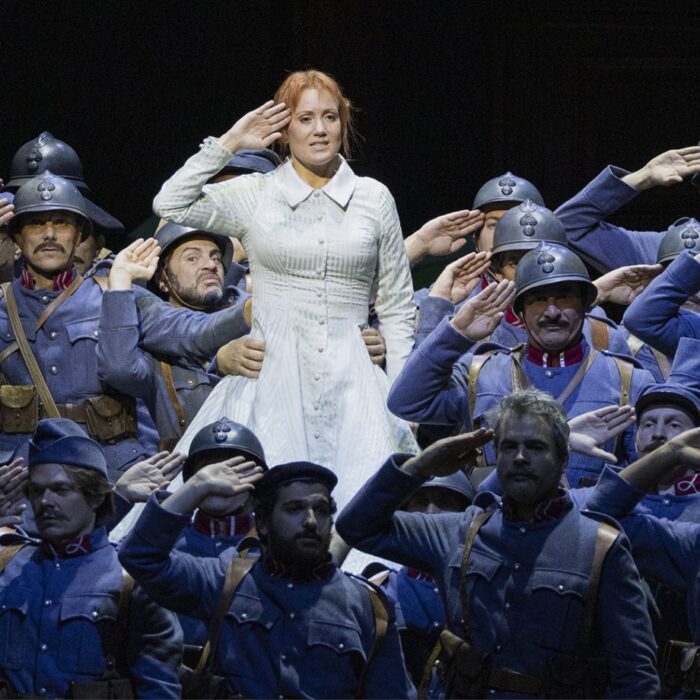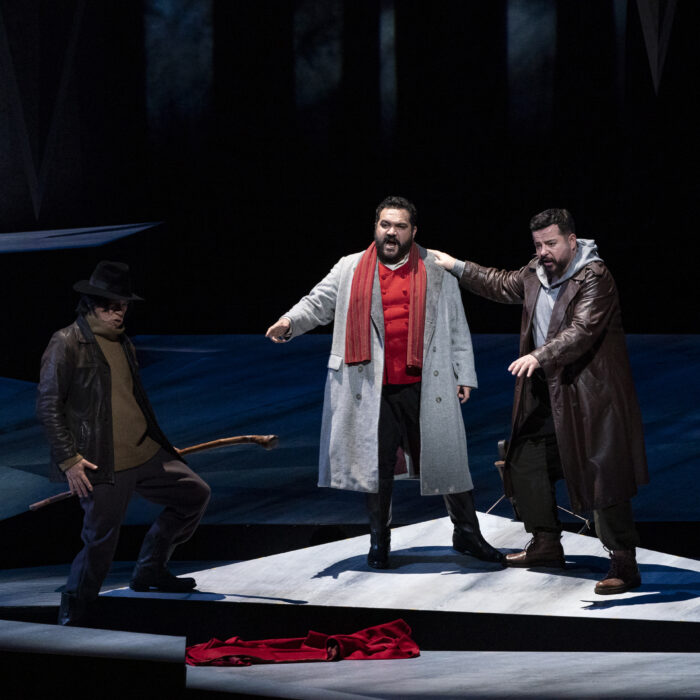
Herbst Theater 2023 Review: Prospero’s Island
By Lois Silverstein(Credit: Jeremy KNight)
“Prospero’s Island,” a brand-new opera from Allen Shearer and Claudia Stevens, opened Saturday night at San Francisco’s Herbst Theater. Original, thought-provoking, engaging musical richness and full of ideas, “Prospero’s Island” was greeted by great applause. A co-production of InTandem and Ninth Planet, it was the tenth chamber opera Shearer and Stevens have composed and produced together. As with their last two–“Middlemarch in Spring” (2015) and “Howard’s End” (2019)–they brought together a highly talented cast and orchestra to give us their version of Shakespeare’s magical tale.
Shearer’s music led the story in its own rich, strange, and evocative ways. Mingling sounds of human conflict and the ocean, moments of secrecy and fresh revelations, the chamber orchestra of twelve instruments, conducted by Nathaniel Berman, dramatized the narrative with feeling and thoughtful ideas. It was a lively, colorful, and expressive work, evocative of the period in which the opera was set–the 1950s–and also of the larger landscape of the imaginative world in which the psychological action takes place. Shearer has said, “If I were writing concert music, I would not … use imported material or styles. But opera needs a broader canvas. I have left the door open for whatever is needed to tell the story, whether popular dance music, a lusty country song, or familiar quotes from Mozart.”
Stevens wrote the opera’s libretto, based upon Shakespeare’s original “The Tempest,” and what a powerful and original libretto it was! Rich in allusions to both Shakespeare’s text and other aspects of the modern literary and musical landscape, Stevens set the story of Prospero at the bottom of the globe, in the Falkland Islands. The image of island life which she conjured up was certainly thought-provoking. Her Prospero is an ex-Nazi scientist who runs a school that teaches, among other things, algebra to penguins. Prospero is also a father who has raised and readied his daughter to live in the world in a forward-thinking and benevolent way. Prospero is now a creator who sets two slaves forward to do his bidding, but who ultimately liberates them to live new and fulfilling lives. Clearly this former autocrat lives up to the full meaning of his name: Pro-Spero, or “On Behalf of Hope.” The narrative was one which suggested that bad deeds and faulty thinking may one day be overcome through education and endeavors dedicated to human connectedness, thoughtfulness, and caring.
We were introduced to Mandy–the Miranda of this retelling–who was much more than an ‘Oh brave new world…’ ingenue in this opera. She instead became a contemporary heroine in-keeping with modern women. She was even willing to say goodbye to a father she had loved and admired for the sake of a new vision of life: one that included social engagement. Stevens explored ideas concerning the nature of power and privilege within the multiple tyrannies of hierarchy, the extensive possibilities of education, and the reverberations of the power of love among equals. This was more than a garden of Eden where Adam named all the flowers. Here there were birds that could empathize as well as perform equations.
Artful Juxtapositions
Prospero was performed by baritone Andrew Dwan. With ease and beautiful sound, Dwan’s interpretation of the former Nazi showed us the complexity of his character. His lust for controlling nature, including human beings, and his appreciation of it, was well-articulated. This was especially evident in his relationship with his slaves, who appeared obedient to a fault and determined to carry out his slightest whim. This was artfully juxtaposed by his yearning for his daughter’s happiness and fulfillment. His voice remained sonorous and caring throughout, and just when we thought we had heard its full range and expression, he tapped into another level of it and sang with plangent depth. Perhaps more facial expression and gesture would have better emphasized the key aspects of his character, but overall his portrayal was moving. In fact, although it was more than appropriate that he was punished for his past evils, we nonetheless felt a pang of remorse to see someone with his remarkable skills and intelligence go down that path. The part, at moments, had overtones of Macbeth, without the demonic elements which that antihero brings to the stage. Both character and performance highlighted Stevens and Shearer’s skills in character layering: something which their previous operas have also displayed in abundance.
As with Prospero, so too with Mandy. Coloratura-soprano Amy Foote sang with color and fluidity and, as my companion in the audience noted, her voice retained its bloom throughout. Foote enabled us to see and appreciate just how Prospero’s intelligent mentoring of his daughter could lead to positive results. Prospero was, in fact, in awe of the possibilities which came from allowing his daughter to develop her character. No longer was she Shakespeare’s pale heroine but, as she grew in sensitivity and knowledge, a modern leader. At this revelation Prospero was nothing but delighted. Oh brave new world that has such daughters in it! We watched as Mandy evolved into a woman who was so much more than a toy or pet, and when Foote ultimately exited the stage, we felt buoyed by the strength of a woman who excellently amplified our 21st century attitudes. Foote’s voice kept the tone of the opera silvery and magical, while its color and sparkle repeatedly reminded us of how beautiful the world can be, despite the evil currents that crisscross it.
Andy–Shakespeare’s Ferdinand–was sung by tenor Sergio Gonzalez, who performed with aplomb and skill. His evolution from surprised and anxious air-crash survivor into a sincere and authentic lover was more than convincing. He sang with ardor, and if his vocal weight at moments did not satisfy, he fulfilled his role as Mandy’s lover par excellence. His words and attitude ultimately convinced her to express her own feelings more emphatically, and to give herself permission to love him back. The ardent duet between the two lovers in the second act was young love with all its expectancy, fully embodied. More than Shakespeare’s two-dimensional Ferdinand, Andy as interpreted by Gonzalez was conviction and energy.
Ariel and Caliban, Prospero’s “slaves” and unnatural creations–in this bold retelling they are evidence of Prospero’s earlier Nazi experiments–sang and acted with great energy and theatrical know-how. Ariel was embodied by coloratura-soprano Shawnette Sulker, who performed with secure and captivating beauty. A visually iridescent and limber Ariel, she dazzled with her pleading, teasing, telling, and disclosing: her manner matching the sparkling costume she wore. Another addition to the narrative which gave a new dimension of story and diversity was Prospero’s revelation that Ariel’s mother, Naomi, had been Jewish. Ariel’s subsequent comment, “How wonderful ordinary must be,” took on new meaning, accenting the narrative thread which flowed compellingly throughout the opera. What a variable mixture life is, in fact!
Caliban, sung by baritone Bradley Kynard, not only looked the part but acted with energy and thoughtfulness. He sang with wit and punctuated his lines with appropriate small fusillades of pique. He was plaintive when he stated his case as Caliban, although he did not quite evoke the pathos that sometimes Caliban deserves. This was supplanted by familiar ‘Caliban-esque’ antics–much grovelling, in fact–yet it was clear that he was a different ‘breed’ of Caliban to the one we may have expected. When Prospero left the island to face his punishment, he appointed Caliban its ruler, and the libretto showed how Caliban could turn from something odd into a more-than-capable individual. His corralling of the penguins at the end in a single, caring gesture illustrated the direction that his character would evolve once Prospero had departed.
Steffi–once Stefano–sung by soprano Julia Hathaway, and Trish–once Trinculo–sung by soprano Angela Jarosz, added a welcome comic touch. Dressed to ‘kill’–literally as much as figuratively, as they have a mission to capture Prospero–they appeared in the second act, and just in time. The duo picked up the narrative pace with grace, and both were in lustrous voice. This was just what was needed to prod the action towards its resolution. When they welcomed Captain Al–once Alonso–near the finale, it was with a playful cackle. Meanwhile the bass playing the Captain, Michael Mendelsohn, hit the nail on the head in his clever characterisation of that role.
To top it all off, we had the Singing Penguins. This whimsical idea was one which Stevens had long before the rest of “Prospero’s Island” came into being. They proved to be a sheer delight. The San Francisco Girls’ Chorus Level III, directed by well-known Bay Area singer and performer Terry Alvord, performed the parts charmingly, dressed in delightful penguin suits from costume designer Joy Graham Korst. They fluttered about the stage with skill as only a professional chorus could do. In no way were they a mere set decoration; rather they were a legitimate contribution to the production at hand. What else would a clever Prospero do but teach the animal life of the Falklands algebra? The girls’ performance was engaging and enriching. Bravas all around!
Somehow Superfluous
The set, well-done and with multiple projections by Jeremy Knight, seemed somehow superfluous. It is de rigueur, nowadays, to include some modern, technological wizardry in grand or chamber opera, and “Prospero’s Island” was no exception. We had physical raindrops that fell onstage, accompanied by visual projections of planes, helicopters, and the sea. Yet it raised the question: did we need more than the simple suggestion of the sea? Did we really need a ‘realistic’ depiction of where the action was set for a complete sense of immersion, considering it was already such a well-thought-out piece? The choices made with set design did not destroy the overall vision by any means, but nonetheless felt redundant. It all worked well-enough regardless, as did the lovely costumes, which matched the characterization and the sound appropriately. The opera exhibited picturesque set design, appealing colors, and apt and evocative lighting. Overall, it was a well put-together production, neither too much nor too little.
The production was directed by Philip Lowery, who was also scenic director and production manager. Lowery founded Berkeley Contemporary Opera in the 1990s and has directed multiple operas and musical theater works all over the Bay Area. He has also directed two other Shearer-Stevens works in a similarly well-paced, neatly timed, well-forged way. Only in one or two moments did the performance seem to drag or slow down. Most of the time the opera, made out of so many discrete parts, each distinctive and rich in their own way, came together with fluidity and energy. It appeared as a tapestry, rather than a serialized unfolding of action and ideas. This masterful handling of so many distinct elements, woven together into a single stimulating display, meant the audience came away with many colorful images in their heads, coupled with probing questions of guilt and retribution, love and possibility, and a new perspective of the future in which consciousness and attentiveness remain essential to a world in which we can grow.
“Prospero’s Island” left us hopeful. We saw how evil can turn to good if, and when, we allow ourselves to experience the benefits of compassionate and sometimes risky education: when we permit ourselves the emotional intelligence to uproot and weed out any penchants for hierarchical authority and baleful tendencies of greed, hate, and delusion. This is the message behind Prospero’s ultimate capture and departure to face the consequences: we cannot deny nor escape the results of self-indulgent and hurtful choices. Allusions to the Nazi ideals of the Second World War added another dimension to the opera, highlighting this message, and illustrating how these aspects of our own human history would not be forgotten without due punishment, even now, after so many years. As Stevens said in her script, confession is not enough. The opera, with all its magic, told us to grow past our frightening and frightful limitations, while accepting the fact that consequences must follow from them, even on a mysterious and fantastic island where amazing things may happen.


